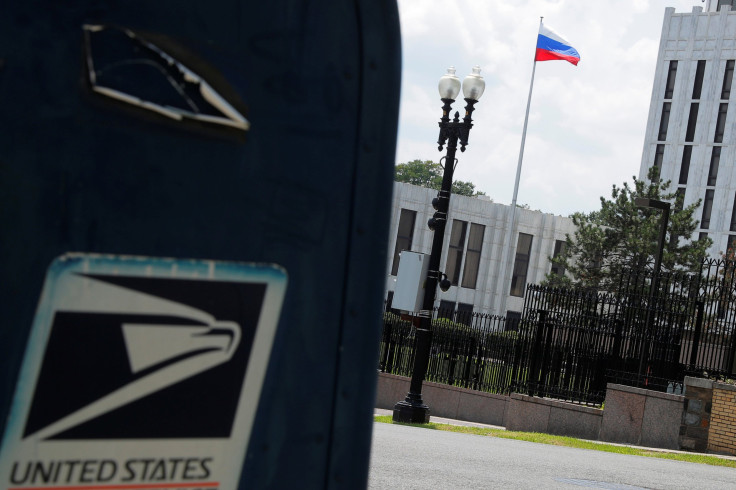Russia Slams ‘US Sanctions Assembly Line’ For Latest Penalties From Trump Administration

The State Department announced Thursday the United States was imposing a new set of sanctions against Russia, “following the use of a ‘Novichok’ nerve agent in an attempt to assassinate UK citizen Sergei Skripal and his daughter Yulia Skripal” in March, an act both the United Kingdom and the U.S. hold Russia responsible for. The Russian Embassy reacted to the announcement by calling the new penalties, set to go into effect in about two weeks, “draconian” and said the “U.S. sanctions assembly line increases its production output.”
According to the State Department, the Russian government was found to be in violation of the Chemical and Biological Weapons Control and Warfare Elimination Act of 1991 (CBW Act) and therefore invited the sanctions onto itself, when it tried to assassinate the Skripals in Salisbury, U.K. In a teleconference following the announcement, a senior state department official explained the CBW Act mandates sanctions against countries that use chemical or biological weapons against their own citizens or in violation of international law.
The new sanctions would mean “a presumption of denial for all national security sensitive goods or technologies that are controlled by the Department of Commerce pursuant to the Export Administration Regulations,” he said. That means if Russian state-owned or state-funded companies wanted to import these products from the U.S., they would be denied the license to do so. There would be exceptions for things like spaceflight and commercial aviation and so on.
Without elaborating on the exact goods being targeted, the official only said the list historically included “things like aero gas turbine engines, electronic devices and components, integrated circuits, test and calibration equipment of various sorts, materials, production, equipment, and various things like that. The list is enormously elaborate.” Depending on what the Russians chose to apply for, and the number of applications that would be turned down, the cost of these sanctions could run up to hundreds of millions of dollars in lost trade potentially.
Once the latest round of sanctions goes into effect, Russia would have three months to prove that it was not using those unlawful weapons anymore, and provide an assurance that it wouldn’t do so again. It would also have to allow international observers to verify the first two claims. Failing this, a second round of sanctions, much tougher than the first, would come into effect, the official said.
Russia has always denied its involvement in the poisoning of the Skripals with a nerve agent, and has demanded evidence that is basis for the accusations against it.
After the State Department announcement, the Russian Embassy put up a statement on its website: “We grew accustomed to not hearing any facts or evidence. The American side refused to answer our follow-up questions, claiming that the information is classified. However, we were told that the U.S. has enough intel to conclude that ‘Russia is to blame.’ For our part, we reiterated our principle stands on the events in the U.K., which the Embassy had been outlining in corresponding letters to the State Department. We confirmed that we continue to strongly stand for an open and transparent investigation of the crime committed in Salisbury and for bringing the culprits to justice. We suggested publishing our correspondence on this issue. No answer has followed so far.”
© Copyright IBTimes 2025. All rights reserved.





















